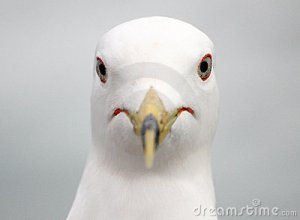
A seagull and / or management consultant.
I didn’t get the marketing job, but In the process I was asked to write a bit about management consultants…
When I think of management consultants, I am reminded of a joke my aunt used to tell by a warm, Dickensian fireside, brandy in hand, on a cold, winters night: ‘’Management consultants are like seagulls; they swoop in, swoop out, leave a huge mess and have a large bill.’’
Needless to say, the setting is false, but the joke, and its apparent hilarity, is unfortunately very real (she herself was previously an employee of Gemini Consulting).
Alongside this, the only thoughts I seem to be able to conjure up are of suits, briefcases, and the Big Smoke – an appropriate blend of vague, grey and possibly pinstriped images.
This conclusively reveals my lack of hard knowledge about management consulting. However, it’s a start. Hopefully the joke would not exist if it was not grounded in some sort of truth. The seagull is opportunistic; it sees a situation from which it can benefit, and thus swoops down to take advantage of it.
This could be applied to much business practice, but then again, business is exactly what consultants deal with, and in: it is the immaterial. The service rendered. The tertiary industry that alone makes up 70-80% of the UK’s GDP.
Ok, that’s all well and good, but how do you manufacture the immaterial? How do consultants keep on making money for their firms? In seeking an answer to this, I defer to a quote from the currently popular TV show, Game of Thrones:
‘’Chaos is a ladder’’ quips Littlefinger; a sly, Machiavellian advisor to the King.
Perhaps chaos maybe a little too dramatic, what consultants thrive upon would appear to be change. The role itself is reactionary; if there is no stimulus to respond to, then how can consultants swoop in and advise upon how to navigate a rough patch in the market, and as a result, climb the ladder?
Whilst they may be Herculean in times of change, periods of stagnation would appear to be the consultants’ Achilles Heel. As Fiona Czerniawska writes in her blog ‘Thought Leadership: In Need of a New Leader’: ‘’[thought leadership] was stuck, Groundhog Day-like, in the mindset of 1916…’’. With a global economy slowly clawing its way out of recession, here likened to the near-dormant middle stages of the First World War, companies were beginning to invest more freely, but not in consultancy.
Further impotence would seem be suggested by the lack of ability of the management consultant to create the ‘’chaos’’ in which he or she can thrive. And this is where the comparison with our seagull does finally fall apart.
A seagull may adjust its flight-path along a sandy shore to intercept the unsuspecting child with her cone of deep fried food, and in the chaos that ensues, steal a chip, and fly off in an up-draft of glory.
The management consultant must queue in line at the kiosk, and await his turn in the fried potato pecking order of opportunity.

